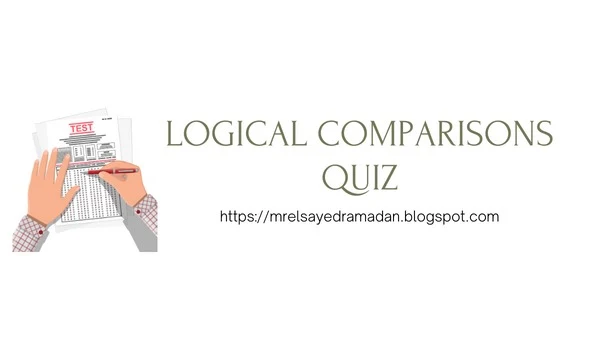Logical Comparisons Quiz
Standardized tests are a common assessment tool used to evaluate student performance and measure their knowledge in various subjects. One important aspect of standardized tests is the ability to understand and analyze logical comparisons. These types of questions present a statement or scenario and ask the test-taker to determine the relationship between two elements. In order to excel on standardized tests, it is crucial for students to develop their skills in understanding and analyzing logical comparisons. In this blog post, we will explore various strategies and techniques for tackling logical comparison questions on standardized tests, through a series of quizzes and examples. By the end of this post, readers will have a deeper understanding of how to approach these types of questions and will be well-prepared to excel on standardized tests.
1/8
Ignoring online trolls, especially the persistent ones, is often more difficult than attacking them outright.
NO CHANGE
to outright attack them
to attack them outright
it is attacking them outright
Explanation: The original phrasing is logical and parallel because ignoring and attacking are both gerunds. Choices B and C are incorrect because they use the infinitive form, which breaks the parallel structure. Choice D is incorrect because the phrase it is attacking is not parallel in form to the gerund ignoring.
2/8
Many critics agree that Kyrchek’s latest film is better than anything she has done.
NO CHANGE
everything she has done
anything else she has done
any of the work she did
Explanation: Choices A, B, and D are all illogical comparisons because Kyrchek’s latest film must be included in anything she has done or everything she has done or any of the work she did. Only choice C excludes her current film so that a logical comparison can be made.
3/8
The motors of all-electric cars are much quieter than combustion engine cars.
NO CHANGE
combustion engines
cars with combustion engines
those of combustion engines
Explanation: Choices A and C are incorrect because they make a category error in comparing motors of cars to cars. Choice B makes a logical comparison because engines are motors. Choice D is incorrect because it is redundant: those and engines refer to the same noun.
4/8
The Surrealists were as inscrutable, if not more so, than the Dadaists.
NO CHANGE
inscrutable as, if not more inscrutable than,
inscrutable as, if not more so, than
inscrutable, if not more inscrutable, than
Explanation: Each choice contains an interrupting modifier, but only choice B remains idiomatic, logical, and grammatical after this interrupter is trimmed from the sentence.
5/8
Mathematics lessons given by the Japanese teachers, unlike teachers in American classrooms, were focused on solving a single complex problem rather than many simpler but similar problems.
NO CHANGE
American teachers
those given by American teachers
American classrooms
Explanation: The subject of this sentence is lessons, so the comparison to teachers in choices A and B is illogical. Choice D is incorrect because comparing lessons to classrooms is also illogical. Only choice C makes a logical comparison: the parallel structure makes it clear that pronoun those refers to lessons.
6/8
To contemporary readers, Modernist poetry is much less accessible than even Victorian or Elizabethan poetry.
NO CHANGE
Victorian or Elizabethan poets
those of Victorian or Elizabethan poets
that of Victorian or Elizabethan poetry
Explanation: The original phrasing is logical because it makes a like-to-like comparison between Modernist poetry and Victorian or Elizabethan poetry. Choice B is incorrect because poetry cannot be compared to poets. Choice C is incorrect because those lacks a logical antecedent with which it agrees in number. Choice D is redundant because that and poetry both have the same referent.
7/8
As transparency in banking increases, less customers will voluntarily pay unreasonable account fees.
NO CHANGE
fewer customers would
fewer customer will
less customers would
Explanation: Since customers are countable and non-continuous quantities, less is an illogical modifier, and should be changed to fewer, as in choices B and C. However, choice B is incorrect because the subjunctive would pay contradicts the indicative mood in the clause transparency in banking increases.
8/8
At high altitudes, even more taxing than climbing without supplemental oxygen was we had to watch for avalanches.
NO CHANGE
we needed to watch
needing to have watched
having to watch
Explanation: This sentence has an inverted syntax, and the sentence can only be parsed logically if the underlined phrase is a noun or noun phrase that serves as the subject of the sentence. Choices C and D both provide gerundive noun phrases as subjects, butonly choice D creates a logical and parallel comparison when “uninverted”: Having to watch for avalanches at high altitudes was even more taxing than climbing without supplemental oxygen.

